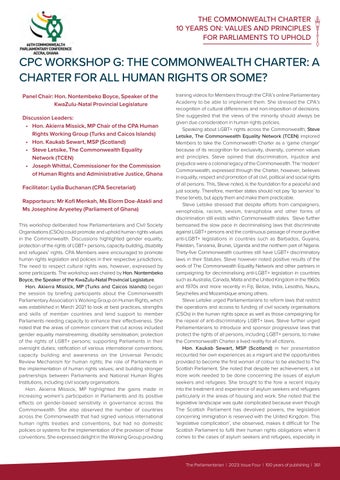THE COMMONWEALTH CHARTER 10 YEARS ON: VALUES AND PRINCIPLES FOR PARLIAMENTS TO UPHOLD
CPC WORKSHOP G: THE COMMONWEALTH CHARTER: A CHARTER FOR ALL HUMAN RIGHTS OR SOME? Panel Chair: Hon. Nontembeko Boyce, Speaker of the KwaZulu-Natal Provincial Legislature Discussion Leaders: • Hon. Akierra Missick, MP Chair of the CPA Human Rights Working Group (Turks and Caicos Islands) • Hon. Kaukab Sewart, MSP (Scotland) • Steve Letsike, The Commonwealth Equality Network (TCEN) • Joseph Whittal, Commissioner for the Commission of Human Rights and Administrative Justice, Ghana Facilitator: Lydia Buchanan (CPA Secretariat) Rapporteurs: Mr Kofi Menkah, Ms Elorm Doe-Atakli and Ms Josephine Aryeetey (Parliament of Ghana) This workshop deliberated how Parliamentarians and Civil Society Organisations (CSOs) could promote and uphold human rights values in the Commonwealth. Discussions highlighted gender equality, protection of the rights of LGBT+ persons, capacity-building, disability and refugees’ rights. CPA Members were encouraged to promote human rights legislation and policies in their respective jurisdictions. The need to respect cultural rights was, however, expressed by some participants. The workshop was chaired by Hon. Nontembeko Boyce, the Speaker of the KwaZulu-Natal Provincial Legislature. Hon. Akierra Missick, MP (Turks and Caicos Islands) began the session by briefing participants about the Commonwealth Parliamentary Association’s Working Group on Human Rights, which was established in March 2021 to look at best practices, strengths and skills of member countries and lend support to member Parliaments needing capacity to enhance their effectiveness. She noted that the areas of common concern that cut across included gender equality mainstreaming; disability sensitisation; protection of the rights of LGBT+ persons; supporting Parliaments in their oversight duties; ratification of various international conventions; capacity building and awareness on the Universal Periodic Review Mechanism for human rights; the role of Parliaments in the implementation of human rights values; and building stronger partnerships between Parliaments and National Human Rights Institutions, including civil society organisations. Hon. Akierra Missick, MP highlighted the gains made in increasing women’s participation in Parliaments and its positive effects on gender-based sensitivity in governance across the Commonwealth. She also observed the number of countries across the Commonwealth that had signed various international human rights treaties and conventions, but had no domestic policies or systems for the implementation of the provision of those conventions. She expressed delight in the Working Group providing
training videos for Members through the CPA’s online Parliamentary Academy to be able to implement them. She stressed the CPA’s recognition of cultural differences and non-imposition of decisions. She suggested that the views of the minority should always be given due consideration in human rights policies. Speaking about LGBT+ rights across the Commonwealth, Steve Letsike, The Commonwealth Equality Network (TCEN) implored Members to take the Commonwealth Charter as a ‘game changer’ because of its recognition for exclusivity, diversity, common values and principles. Steve opined that discrimination, injustice and prejudice were a colonial legacy of the Commonwealth. The ‘modern’ Commonwealth, expressed through the Charter, however, believes in equality, respect and promotion of all civil, political and social rights of all persons. This, Steve noted, is the foundation for a peaceful and just society. Therefore, member states should not pay ‘lip service’ to these tenets, but apply them and make them practicable. Steve Letsike stressed that despite efforts from campaigners, xenophobia, racism, sexism, transphobia and other forms of discrimination still exists within Commonwealth states. Steve further bemoaned the slow pace in decriminalising laws that discriminate against LGBT+ persons and the continuous passage of more punitive anti-LGBT+ legislations in countries such as Barbados, Guyana, Pakistan, Tanzania, Brunei, Uganda and the northern part of Nigeria. Thirty-five Commonwealth countries still have LGBT+ discriminatory laws in their Statutes. Steve however noted positive results of the work of The Commonwealth Equality Network and other partners in campaigning for decriminalising anti-LGBT+ legislation in countries such as Australia, Canada, Malta and the United Kingdom in the 1960s and 1970s and more recently in Fiji, Belize, India, Lesotho, Nauru, Seychelles and Mozambique among others. Steve Letsike urged Parliamentarians to reform laws that restrict the operations and access to funding of civil society organisations (CSOs) in the human rights space as well as those campaigning for the repeal of anti-discriminatory LGBT+ laws. Steve further urged Parliamentarians to introduce and sponsor progressive laws that protect the rights of all persons, including LGBT+ persons, to make the Commonwealth Charter a lived reality for all citizens. Hon. Kaukab Sewart, MSP (Scotland) in her presentation recounted her own experiences as a migrant and the opportunities provided to become the first woman of colour to be elected to The Scottish Parliament. She noted that despite her achievement, a lot more work needed to be done concerning the issues of asylum seekers and refugees. She brought to the fore a recent inquiry into the treatment and experience of asylum seekers and refugees particularly in the areas of housing and work. She noted that the legislative landscape was quite complicated because even though The Scottish Parliament has devolved powers, the legislation concerning immigration is reserved with the United Kingdom. This ‘legislative complication’, she observed, makes it difficult for The Scottish Parliament to fulfil their human rights obligations when it comes to the cases of asylum seekers and refugees, especially in
The Parliamentarian | 2023: Issue Four | 100 years of publishing | 361
